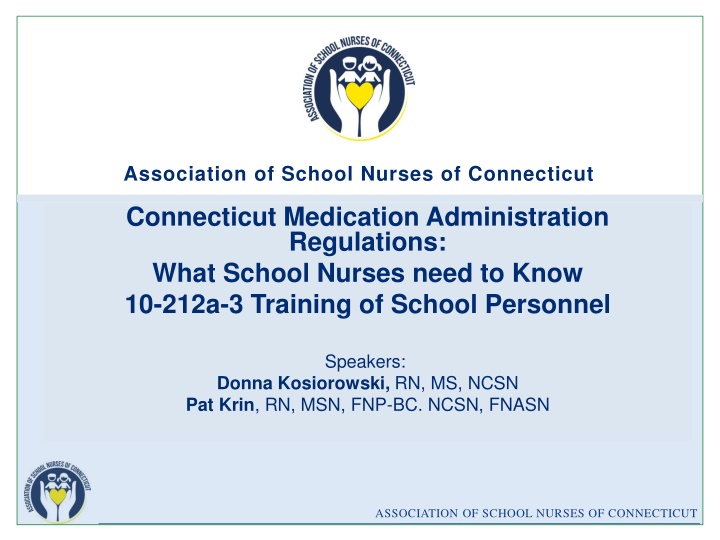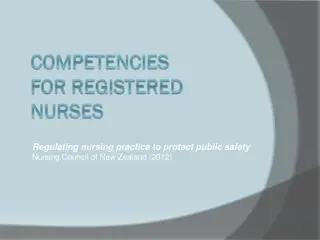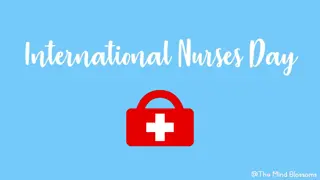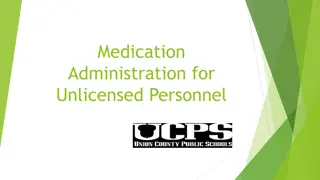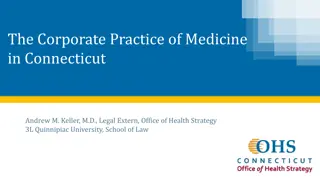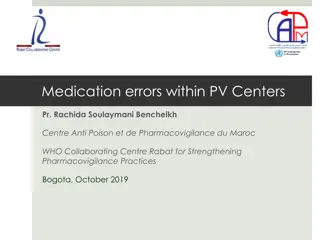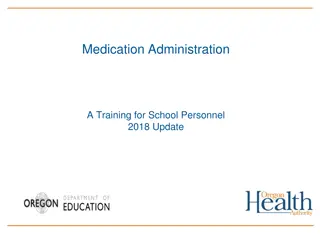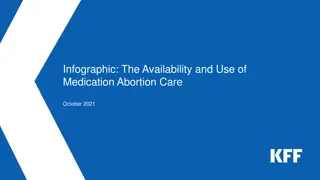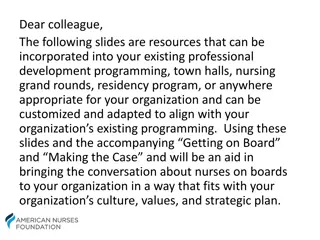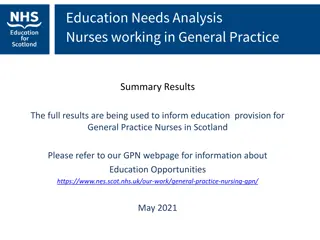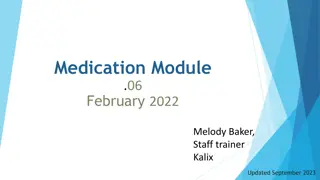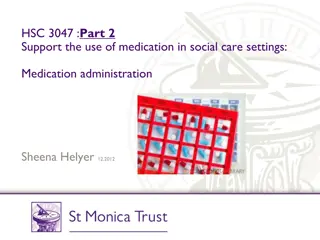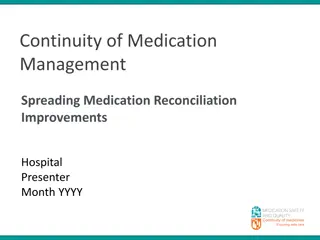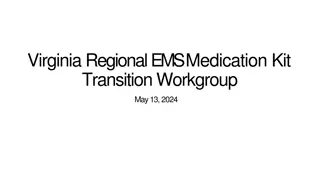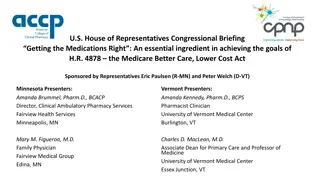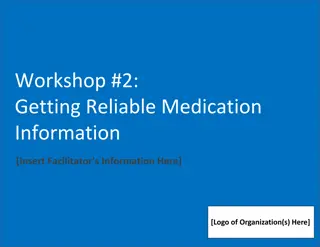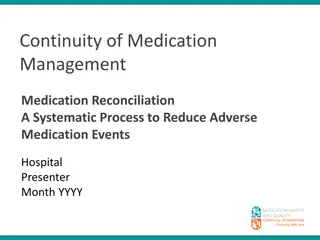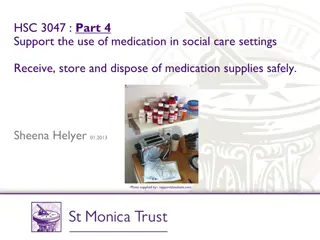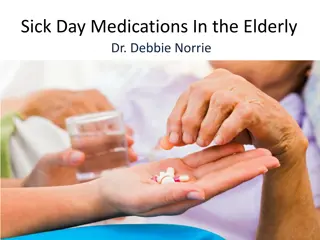Connecticut School Nurses Medication Administration Regulations
This document discusses the regulations and training requirements for Connecticut school nurses and qualified personnel administering medications to students in the absence of a school nurse. Training includes safe administration, handling, documentation, and specific medication information. Annual training is mandated for designated personnel to ensure student safety.
Download Presentation

Please find below an Image/Link to download the presentation.
The content on the website is provided AS IS for your information and personal use only. It may not be sold, licensed, or shared on other websites without obtaining consent from the author.If you encounter any issues during the download, it is possible that the publisher has removed the file from their server.
You are allowed to download the files provided on this website for personal or commercial use, subject to the condition that they are used lawfully. All files are the property of their respective owners.
The content on the website is provided AS IS for your information and personal use only. It may not be sold, licensed, or shared on other websites without obtaining consent from the author.
E N D
Presentation Transcript
Association of School Nurses of Connecticut Connecticut Medication Administration Regulations: What School Nurses need to Know 10-212a-3 Training of School Personnel Speakers: Donna Kosiorowski, RN, MS, NCSN Pat Krin, RN, MSN, FNP-BC. NCSN, FNASN ASSOCIATION OF SCHOOL NURSES OF CONNECTICUT
Section 10-212a-3.Training of School Personnel (a) Each board of education which allows qualified personnel for schools, in the absence of the school nurse, to administer medications to students who have a written order from a physician, dentist, optometrist, APRN, or PA, and the written authorization of a parent or guardian, shall provide training to designated qualified school personnel for schools in the safe administration of medications at least annually. ASSOCIATION OF SCHOOL NURSES OF CONNECTICUT
Section 10-212a-3.Training of School Personnel (b) Only qualified personnel for schools who have received such annual training from the SN or SMA shall be allowed to administer medications to students who have a written order from a physician, dentist, optometrist, APRN, or PA, and the written authorization of a parent or guardian. ASSOCIATION OF SCHOOL NURSES OF CONNECTICUT
Section 10-212a-3.Training of School Personnel This training shall include, but not be limited to: 1) General principles of safe administration of medication; 2) Procedural aspects of the administration of medication, including the safe handling and storage of medications and documentation; and 3) Specific info related to each student s medication and each student s medication plan including the name and generic name of the medication, indications for the medication, dosage, routes, time and frequency of administration, therapeutic effects of the medication, potential side effects, overdose or missed dose of the medication, and when to implement emergency interventions. ASSOCIATION OF SCHOOL NURSES OF CONNECTICUT
Section 10-212a-3.Training of School Personnel (c) Qualified school employees who administer epinephrine as emergency first aid to students who do not have a prior written authorization of a parent or guardian or written order of a qualified medical professional for the administration of epinephrine shall, annually, complete the training program developed by DOE and DPH in conjunction with the School Nurse Advisory Council pursuant to 10-212g of the C.G.S. and training in CPR and first aid. ASSOCIATION OF SCHOOL NURSES OF CONNECTICUT
Section 10-212a-3.Training of School Personnel (d) BOE shall maintain documentation of such training as follows: (1) Dates of general and student-specific training; (2) Content of the training; (3) Individuals who have completed general and student specific training; and (4) Name and credentials of school nurse or school medical advisor trainer or trainers. ASSOCIATION OF SCHOOL NURSES OF CONNECTICUT
Section 10-212a-3.Training of School Personnel (f) Licensed Practical Nurses(LPNs) May administer medications if they can demonstrate evidence of one of the following: Training in med administration as part of their basic nursing program; A pharmacology course and subsequent supervised experience; Supervised experience in med administration while employed in a health care facility. Shall not train or delegate to another individual. Shall only administer meds after a MAP has been established by the school nurse. ASSOCIATION OF SCHOOL NURSES OF CONNECTICUT
Association of School Nurses of Connecticut Connecticut Medication Administration Regulations: What School Nurses need to Know 10-212a-4 Self-administration of medications ASSOCIATION OF SCHOOL NURSES OF CONNECTICUT
Sec. 10-212a-4 Self-Administration of medications The BOE shall permit students with verified chronic medical condition and deemed capable to self-administer prescribed emergency medication, including rescue asthma inhalers and cartridge injectors for medically-diagnosed allergies, and may permit students to self-administer other medications, excluding controlled drugs as defined in Section 10-212a-1 provided: (a) authorized prescriber provides written medication order including recommendation for self-administration; ASSOCIATION OF SCHOOL NURSES OF CONNECTICUT
Sec. 10-212a-4 Self-Administration of medications The BOE shall allow students to self-administer (cont) (b) in the school setting and deemed it safe a parent/guardian or eligible student provides written authorization for self administration; (c) (1) school nurse has assessed student s competency for self-administration d appropriate including that a student: (A) is capable of identifying and selecting the appropriate medication by size, color, amount or other label identification; ASSOCIATION OF SCHOOL NURSES OF CONNECTICUT
Sec. 10-212a-4 Self-Administration of medications (B) knows the frequency and time of day medication is ordered; (C) identifies presenting symptoms that require the medication; (D) administers the medication appropriately; (E) maintains safe control of medication at all times; (F) seeks adult supervision whenever warranted; (G) cooperates with the established medication plan. ASSOCIATION OF SCHOOL NURSES OF CONNECTICUT
Sec. 10-212a-4 Self-Administration of medications (2) in the case of inhalers for asthma and cartridge injectors for medically-diagnosed allergies, the school nurse s review of a student s competency to self-administer inhalers or cartridge injectors shall not be used to prevent a student from retaining and self-administering such medication. Students can self-administer medication with only the written authorization of an authorized prescriber and written authorization from a student s parent/guardian or eligible student. ASSOCIATION OF SCHOOL NURSES OF CONNECTICUT
Sec. 10-212a-4 Self-Administration of medications (d) The school nurse has: (1)Reviewed the medication order and parental authorization (2)Developed an appropriate plan for self-administration, including provisions for general supervision; and (3)Documented the medication plan for self- administration in the student s/participant s health record (e) The principal and appropriate staff are informed that the student is self-administering ASSOCIATION OF SCHOOL NURSES OF CONNECTICUT
Sec. 10-212a-4 Self-Administration of medications (d (f) Such medication is transported by the student to the school and maintained under the student s control in accordance with the BOE s policy on self-administration by student s and the individual student plan; and (g) self-administration of controlled medication, as defined in Section 10-212a-1 may be considered for extraordinary situation, such as international field trips, and shall be approved by the school nurse supervisor and the school medical advisor in advance and an appropriate plan is developed. ASSOCIATION OF SCHOOL NURSES OF CONNECTICUT
Association of School Nurses of Connecticut Connecticut Medication Administration Regulations: What School Nurses need to Know 10-212a-5 Handling, storage and disposal of medications ASSOCIATION OF SCHOOL NURSES OF CONNECTICUT
Section 10.2112a-5. Handling, storage and disposal of medications (a) All medication, except those approved for self- medication and epinephrine to be used for the purpose of emergency first aid to students who do not have a prior written authorization of a parent or guardian or a prior written order of a qualified medical professional for the administration of epinephrine, shall be delivered by the parent or other responsible adult to the school nurse or, in the absence of such nurse, other qualified personnel for schools trained in the administration of medication and assigned to the school. ASSOCIATION OF SCHOOL NURSES OF CONNECTICUT
Section 10.2112a-5. Handling, storage and disposal of medications (b) The school nurse shall examine on-site any new medication, medication order and parent authorization and, except for epinephrine to be used for the purpose of emergency first aid to students who do not have a prior written authorization of a parent or guardian or a prior written order of a qualified medical professional for the administration of epinephrine, develop an administration of medication plan before any medication is administered by any school personnel. ASSOCIATION OF SCHOOL NURSES OF CONNECTICUT
Section 10.2112a-5. Handling, storage and disposal of medications (c) The school nurse shall review all medication refills with the medication order and parent authorization prior to administering medication, except for epinephrine intended for emergency administration to students who do not have a written prior authorization or order. ASSOCIATION OF SCHOOL NURSES OF CONNECTICUT
Section 10.2112a-5. Handling, storage and disposal of medications (d) All medications shall be properly stored as followed: (1) Except as otherwise determined by a student s ECP, emergency medications shall be stored in an unlocked, clearly labeled and readily accessible cabinet/container in health room during schools hours, under the general supervision of the school nurse, or In the absence of the school nurse, the principal/principal s designee who has been trained in the administration of medication; ASSOCIATION OF SCHOOL NURSES OF CONNECTICUT
Section 10.2112a-5. Handling, storage and disposal of medications (2) Emergency medications will be locked beyond the regular school day or program hours, except as otherwise determined by a student s ECP; (3) All other non-controlled medications, except those approved for self medication, shall be kept in a designated locked container, cabinet or closet used exclusively for the storage of medication; ASSOCIATION OF SCHOOL NURSES OF CONNECTICUT
Section 10.2112a-5. Handling, storage and disposal of medications (4) In the case of controlled substances, they shall be stored separately from other medications in a separate, secure, substantially constructed locked metal or wood cabinet pursuant to 21a-262-8 of the Regulations of Connecticut State Agencies. (e) Access to all stored medications shall be limited to persons authorized to administer medications. Each school and program shall maintain a current list of those persons authorized to administer medications. ASSOCIATION OF SCHOOL NURSES OF CONNECTICUT
Section 10.2112a-5. Handling, storage and disposal of medications (f) All medications, prescription and non-prescription, shall be delivered and stored in their original containers. (g) At least two sets of keys for the medication containers/cabinets shall be maintained for each school building or program. One set of keys under the direct control of the school nurse and the other set under the direct control of the principal, if necessary the director/lead teacher who has been trained in general principals of medication administration, shall have a set of keys. ASSOCIATION OF SCHOOL NURSES OF CONNECTICUT
Section 10-212a-5 continued (h) Medications requiring refrigeration shall be stored: (1) in a refrigerator at no less than 36 degrees F, and no more than 46 degrees F. 2) the refrigerator shall be located in the health office, maintained for health service purposes with limited access; 3) non-controlled medication may be stored directly on the shelf of the refrigerator. 4) controlled medication shall be stored in a locked box which is affixed to the refrigerator shelf. ASSOCIATION OF SCHOOL NURSES OF CONNECTICUT
Section 10-212a-5. continued (i) All unused, discontinued or obsolete medications shall be removed from storage areas and either returned to the parent/guardian or, if medication cannot be returned to the parent/guardian, the medication shall be destroyed in collaboration with the school nurse: (1) Noncontrolled drugs shall be destroyed in the presence of one (1) witness; (2) Controlled drugs shall be destroyed pursuant to 21a-262-3 of Regulations of Connecticut State Agencies. ASSOCIATION OF SCHOOL NURSES OF CONNECTICUT
Sec. 10-212a-5 continued Accidental destruction or loss of controlled drugs must be verified in the presence of a second person, including confirmation of the presence or absence of residue and jointly documented on the student medication administration record and on a medication error form pursuant Section 10-212a(b) of the Connecticut General Statutes. If no residue is present, notification must be made to Department of Consumer Protection pursuant Section 21a-262-3 of Regulations of Connecticut State Agencies ASSOCIATION OF SCHOOL NURSES OF CONNECTICUT
Sec. 10-212a-5 continued (j) No more than a three months school day supply of medication for a student shall be stored at the school. (k) No medication for a student shall be stored at a school without a current written order from an authorized prescriber. ASSOCIATION OF SCHOOL NURSES OF CONNECTICUT
Section 10-212a-5. continued (3) Accidental destruction or loss of controlled drugs must be verified in the presence of a second person, including confirmation of the presence of absence of residue and jointly documented on the student MAR and on a medication error form pursuant to 10-212a(b) of the C.G.S. If no residue is present notification must be made to the Dept. of Consumer Protection (DCP) pursuant to 21a-262-3 of the Regulations of the Connecticut State Agencies. ASSOCIATION OF SCHOOL NURSES OF CONNECTICUT
Association of School Nurses of Connecticut Connecticut Medication Administration Regulations: What School Nurses need to Know 10-212a-6 Documentation ASSOCIATION OF SCHOOL NURSES OF CONNECTICUT
Section 10-212a-6. Documentation In addition to those records required for controlled drugs, the following shall apply: (a) Each school or before-and-or after- school program and school readiness program where medications are administered shall maintain an individual medication administration record (MAR) for each student who receives medication during school or program hours. ASSOCIATION OF SCHOOL NURSES OF CONNECTICUT
Section 10-212a-6. Documentation (1) Such record shall include: (A)Name of student (maintain individual record for each student). (B)Name of medication (C)Dosage (D)Route (E)Frequency (F)Name of authorized prescriber (G)Dates for initiation and termination, including extended year programs ASSOCIATION OF SCHOOL NURSES OF CONNECTICUT
Section 10-212a-6. Documentation (1) Such record shall include (continued): (H)Quantity received which shall be verified by adult delivering medication. (J)Allergies to food or medicine (J)Date and time of administration and omissions including reason for omission (K)Dose and amount (L) Full written (in ink) or electronic legal signature of nurse or qualified personnel (M) Controlled medications- medication count conducted and documented at least once a week count co-signed by nurse and witness. ASSOCIATION OF SCHOOL NURSES OF CONNECTICUT
Section 10-212a-6. Documentation (2)Transactions shall either be recorded in ink and shall not be altered or shall be recorded electronically in a record that cannot be altered. (3) The medication administration record (MAR) shall be made available to the department for review until destroyed pursuant to the section 11-8a and Section 10-212a(b) of the C.G.S. for controlled medications. ASSOCIATION OF SCHOOL NURSES OF CONNECTICUT
Section 10-212a-6. Documentation (A) The completed medication administration record for non- controlled medications- at the discretion of the school district, may be destroyed in accordance with Section M8 of the Connecticut Municipality Record Retention Schedule so long as it is superseded by a summary on the student health record. http://ctstatelibrary.org/wp-content/uploads/2015/07/M8.pdf ASSOCIATION OF SCHOOL NURSES OF CONNECTICUT
Section 10-212a-6. Documentation (B) The completed medication administration record for controlled medications- shall be maintained in the same manner as non-controlled. In addition, a separate medication administration (MAR) needs to be maintained in the school for three years ( 10-212a(b) of the Connecticut General Statutes (CGS). (b) Written order, written parent authorization to exchange information filed in CHR or program record; (c) Verbal order can only be received by school nurse; ASSOCIATION OF SCHOOL NURSES OF CONNECTICUT
Section 10-212a-6. Documentation Errors definition Means failure to Administer medication to student Administer medication within time designated by prescriber Administer specific medication prescribed for student Administer correct dosage Administer by proper route Administer medication according to generally accepted standards of practice. ASSOCIATION OF SCHOOL NURSES OF CONNECTICUT
Section 10-212a-6. Documentation (d) Errors in the administration of medication (1)The local board of education shall have a policy regarding notification and documentation (A) Manner in which persons are notified (B) Immediately reported to SN, SN supervisor, authorized prescriber or, if none the SMA, and parent/guardian (C) Procedure to be followed in obtaining treatment required as result of error; (2) Report completed using a med error report form authorized by the board to include corrective action (3) Any error shall be documented in CHR or program record ASSOCIATION OF SCHOOL NURSES OF CONNECTICUT
Section 10-212a-6. Documentation (e) Reporting of the emergency administration of epinephrine Following the emergency administration of epinephrine by a qualified school employee to a student who does not have a prior written authorization of a parent or guardian or a prior written order of a qualified medical professional for the administration of epinephrine: (1) Such administration shall be reported immediately to: (A)School nurse or School medical advisor (SMA) by qualified school employee and (B) Parent/Guardian by the school nurse or qualified school employee and Filed or summarized according to established policy. ASSOCIATION OF SCHOOL NURSES OF CONNECTICUT
Section 10-212a-6. Documentation (e) Reporting of the emergency administration of epinephrine (continued) (2) A medication administration record shall be (A) Submitted to the school nurse by the qualified school employee at the earliest possible time, but not later than the next school day, and (B) Filed in or summarized on the student s cumulative health record according to any policy established by the local or regional board of education. ASSOCIATION OF SCHOOL NURSES OF CONNECTICUT
10-208a Physical activity of student restricted Each local and regional board of education shall honor written notice submitted by a licensed practitioner which places physical restrictions upon any pupil enrolled in public schools of such board of education. For the purposes of this section, licensed practitioner means any person who is licensed to practice under chapter 370 Physician 372 Chiropractor* 373 Naturopath* 375 Podiatrist, or 20-94a APRN *Note, Chiropractors and Naturopaths are permitted to write for restricted physical activity only (not prescriptions for med administration). ASSOCIATION OF SCHOOL NURSES OF CONNECTICUT
Association of School Nurses of Connecticut Connecticut Medication Administration Regulations: What School Nurses need to Know 10-212a-7 Supervision ASSOCIATION OF SCHOOL NURSES OF CONNECTICUT
Sec. 10-212a-7. Supervision The school nurse is responsible for general supervision of administration of medications in the schools to which that nurse is assigned. This shall include, but not be limited to: (a) Availability on a regularly scheduled basis to: (1) Review orders and changes to orders, and communicate these to the personnel designated to give medications; (2) Set up a plan and schedule to ensure medications are administered properly; ASSOCIATION OF SCHOOL NURSES OF CONNECTICUT
Sec. 10-212a-7. Supervision (continued) (3) Provide training to qualified personnel for schools and other licensed nursing personnel in med administration and assess that the qualified personnel for schools are competent to administer medications; (4) Support and assist other licensed personnel and qualified personnel for schools to prepare for and implement their responsibilities related to admin of specific meds during school hours. (5) Provide appropriate follow-up to ensure the admin of meds results in desired student outcomes; ASSOCIATION OF SCHOOL NURSES OF CONNECTICUT
Sec. 10-212a-7. Supervision (continued) (6) Provide consultation by telephone or other means of telecommunication. In the absence of the school nurse an authorized prescriber may provide this consultation. (b) Implementation of policies and procedures regarding all phases of med administration; (c) Periodic review of all documentation pertaining to the admin of medications for students; (d) Observe competency to admin meds by qualified personnel for schools; ASSOCIATION OF SCHOOL NURSES OF CONNECTICUT
Sec. 10-212a-7. Supervision (continued) (e) Periodic review, as needed, with licensed nursing personnel and all qualified personnel for schools regarding the needs of any student receiving medications. ASSOCIATION OF SCHOOL NURSES OF CONNECTICUT
Association of School Nurses of Connecticut Connecticut Medication Administration Regulations: What School Nurses need to Know 10-212a-8 Administration of medications by Coaches and Licensed Athletic Trainers during intramural and Interscholastic Sports ASSOCIATION OF SCHOOL NURSES OF CONNECTICUT
Sec. 10-212a-8. Administration of medications by coaches and licensed athletic trainers during intramural and interscholastic events During intramural and interscholastic athletic events a coach or licensed athletic trainer may administer medication for select students for whom self-administration plans are not viable options as determined by the school nurse for (1) Inhalant medications prescribed to treat respiratory conditions and (2) Medication administered with a cartridge injector for students wit a medically diagnosed allergic condition which may require prompt treatment to protect the student against serious harm or death, provided the requirements in subsections (a) to (g), inclusive of this Section have been met. ASSOCIATION OF SCHOOL NURSES OF CONNECTICUT
Sec. 10-212a-8. Administration of medications by coaches and licensed athletic trainers during intramural and interscholastic events (a)The coach or athletic trainer shall be trained in: (1) The general principles of the administration of medication applicable to receiving, storing, and assisting with inhalant medications or cartridge injector medication, and documentation; (2) Student specific needs for assistance according to the individual medication plan. (b) The parent/guardian shall provide to the coach or LAT the medication in accordance with the provisions of subsections (a)-(d), inclusive, of 10-212a-5 of the Regulations of Connecticut State Agencies. The medication provided to the coach or LAT shall be separate from the med stored in the school health office. ASSOCIATION OF SCHOOL NURSES OF CONNECTICUT
Sec. 10-212a-8. Administration of medications by coaches and licensed athletic trainers during intramural and interscholastic events (d) The coach or LAT shall agree to the administration of emergency medication and shall implement the ECP; (e) Meds to be used in athletic events shall be stored: (1) In containers for the exclusive use of holding meds (2) In locations that preserve the integrity of the meds (3) Under the general supervision of the coach or LAT; (4) In a locked secure cabinet when not in use at athletic events. ASSOCIATION OF SCHOOL NURSES OF CONNECTICUT
Sec. 10-212a-8. Administration of medications by coaches and licensed athletic trainers during intramural and interscholastic events (f) Errors in med administration shall be addressed in the same manner as 10-212a-6 of the regulations, except that if the SN is not available, a report may be submitted to the SN on the next school day; and (g) Documentation of any administration of medication by a coach or LAT shall be completed on forms provided by the local school board and the school nurse shall be notified as follows: (1) A separate MAR for each student shall be maintained in the athletic area; ASSOCIATION OF SCHOOL NURSES OF CONNECTICUT
Sec. 10-212a-8. Administration of medications by coaches and licensed athletic trainers during intramural and interscholastic events (g) Documentation (continued); (2) Admin of a cartridge injector shall be reported to the SN as soon as possible , not later than the next school day; (3) All other instances of med admin shall be reported to the school nurse at least monthly or as required by the individual student plan; (4) The MAR shall be submitted to the SN at the end of each sport season and filed in the CHR according to 10-212a-6 of the Regulations of CT State Agencies. ASSOCIATION OF SCHOOL NURSES OF CONNECTICUT
